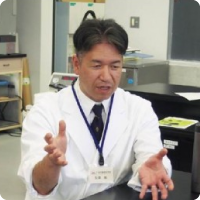- Notice
Cultivate a mindset of constant inquiry and research activities
2013.11.26
Fukushima Prefectural Aizu Gakuho Junior & Senior High School Atsushi Yazawa, Teacher
Aizu Gakuho Senior High School has been designated as a SSH school since April 2010, and currently 50 students in the SSH Exploratory Club are working in groups on their own research themes. They have recently been awarded the Liberace Prize at the Science Castle in TOKYO for their presentation "Evolution of silkworm moth internal functions: How did the elite silkworm moths become gluttonous? ~at Science Castle in TOKYO, where they received the Liverness Award for their research.

Always be thinking as an inquiry department.
The teacher always tells the members of the club to "think for themselves first as to why this is so." He does not immediately tell them the answer; he tries to help them explore the reasons for their own answers. For example, he has grown a new onion and an old onion hydroponically under similar conditions, and one produced roots, but the other did not. They ask, "Let's try to figure out which is the new onion and why." Their answers, with little knowledge, can be wrong, but the important thing here is to always get into the habit of thinking for the sake of exploration. The objective is to cultivate an eye for the underlying essence by taking a hypothetical view of things.
Scientific research on the development of community-based industries
This presentation is the culmination of two years of research, and including graduates, eleven members of the department have been involved in the research so far. The research began when we researched the history of sericulture in Aizu and learned that modern varieties have doubled the production of silk yarn compared to pre-Meiji ones. We all surveyed the literature and noticed that although there was much content on breeding methods, there were few research reports on the evolution of biological functions. Therefore, we decided to study the changes that had occurred in the silkworm moth's internal functions on our own. Since we had never kept silkworms before, we sometimes experienced the spread of disease among the silkworms we were rearing, but with the guidance of experts, we were able to obtain stable data and compile our research. In the future, we plan to verify this discussion by directly examining the silk glands of five-year-old larvae.
Learn about our research philosophy
The teacher is also creative in the exploratory activities in the actual research. In taking over the research, the teacher does not teach. Instead, the older students teach the younger students research methods, and the younger students learn the concept of research. Whenever a problem arises in research, the students learn to work together as a group. The teacher says, "In conducting research, we try to make sure that the research does not end with the experiment or investigation, but ends with a presentation. By presenting their research, the members are able to make the research their own, and through feedback from the participants, they are able to gain new perspectives and points of view that they may have overlooked. In addition, the encounters with various people that are created through the overall research process further increase the "drawers" of the club members, he says. I look forward to seeing more research presentations in the future, in which they will continue to develop their thinking for inquiry.
Fukushima Prefectural Aizu Gakuho Junior & Senior High School presented at Science Castle 2012.
Article in the June 2013 issue of Kyoiku Ouen, a science education information magazine
Affiliations are current at the time of publication in Education Support.
